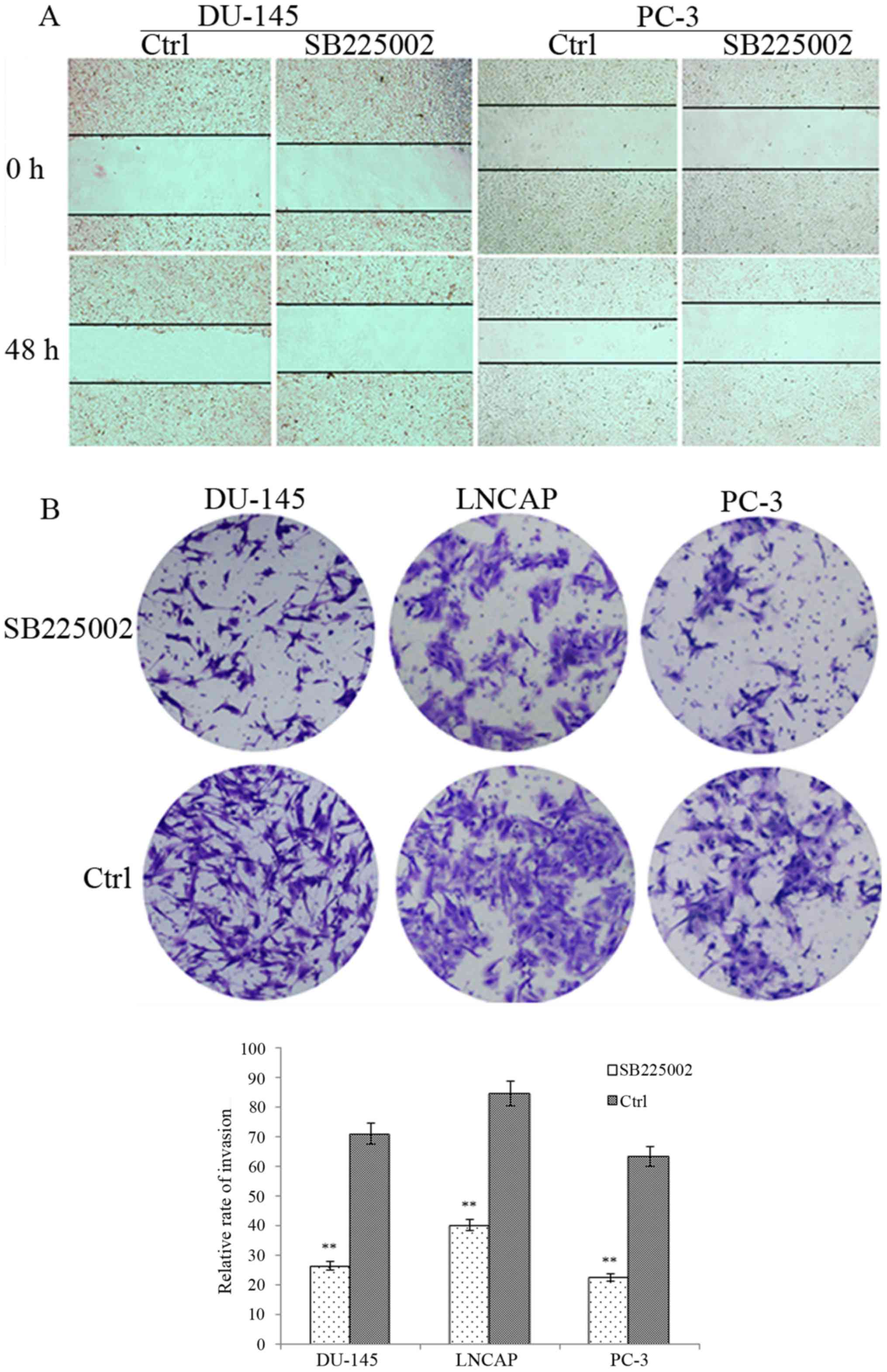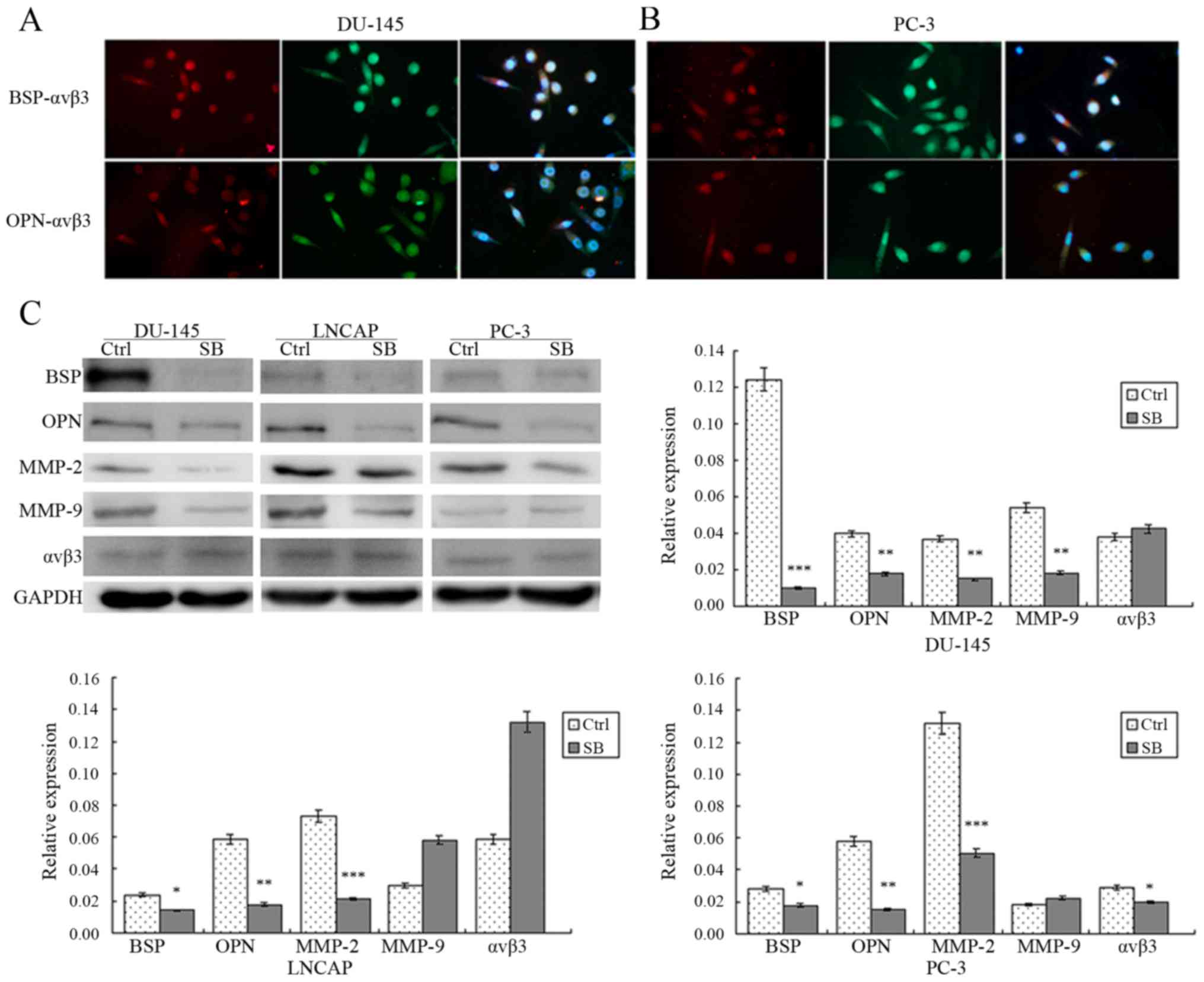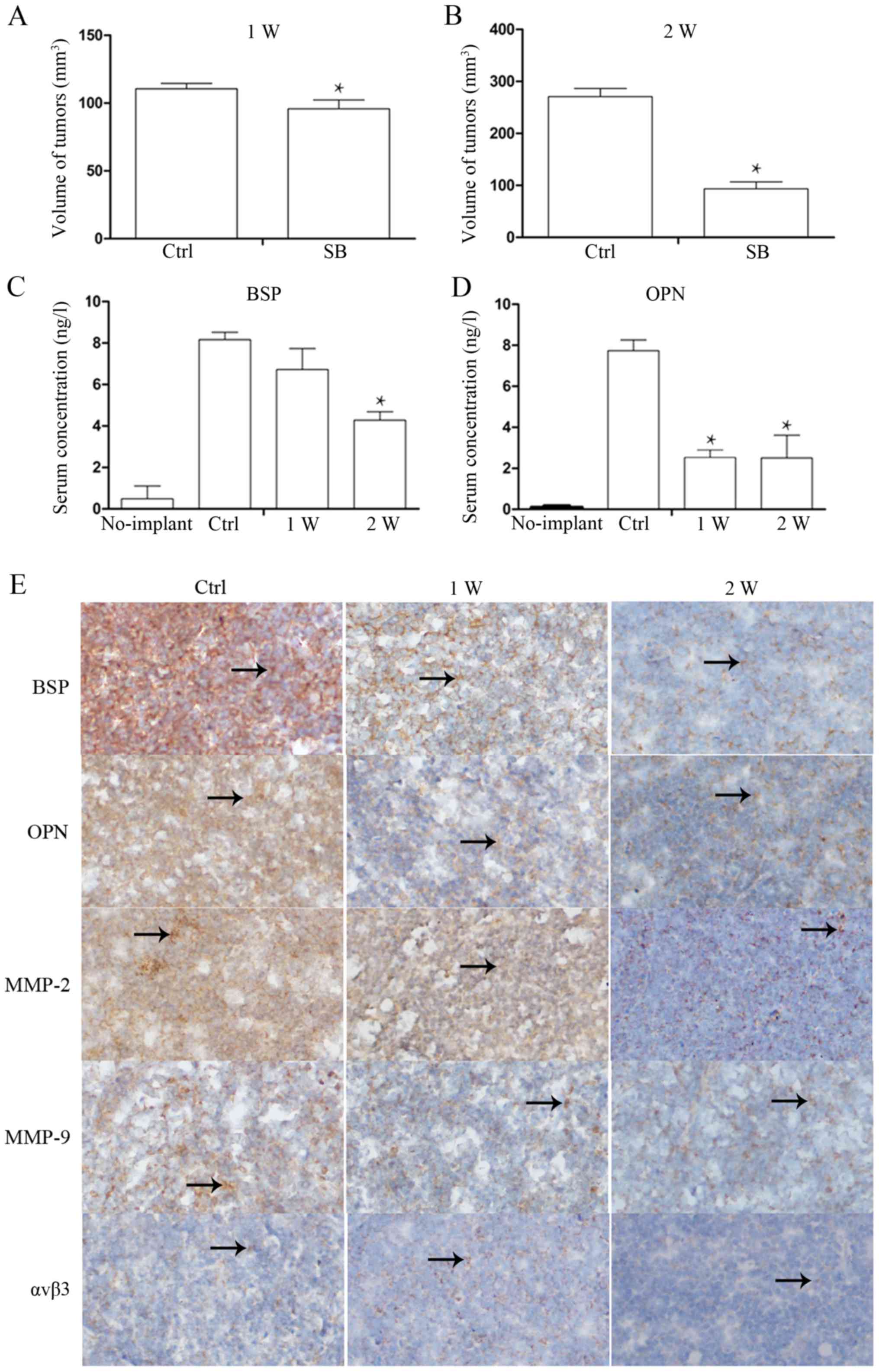|
1
|
Weigelt B, Peterse JL and van't Veer LJ:
Breast cancer metastasis: Markers and models. Nat Rev Cancer.
5:591–602. 2005. View
Article : Google Scholar : PubMed/NCBI
|
|
2
|
Rizzoli R, Body JJ, Brandi ML,
Cannate-Andia J, Chappard D, El Maghraoui A, Glüer CC, Kendler D,
Napoli N, Papaioannou A, et al: Cancer-associated bone disease.
Osteoporos Int. 24:2929–2953. 2013. View Article : Google Scholar : PubMed/NCBI
|
|
3
|
Kruger TE, Miller AH, Godwin AK and Wang
J: Bone sialoprotein and osteopontin in bone metastasis of
osteotropic cancers. Crit Rev Oncol Hematol. 89:330–341. 2014.
View Article : Google Scholar : PubMed/NCBI
|
|
4
|
Chen J, Rodriguez JA, Barnett B, Hashimoto
N, Tang J and Yoneda T: Bone sialoprotein promotes tumor cell
migration in both in vitro and in vivo models. Connect Tissue Res.
44 (Suppl 1):S279–S284. 2003. View Article : Google Scholar
|
|
5
|
Gordon JA, Sodek J, Hunter GK and Goldberg
HA: Bone sialoprotein stimulates focal adhesion-related signaling
pathways: Role in migration and survival of breast and prostate
cancer cells. J Cell Biochem. 107:1118–1128. 2009. View Article : Google Scholar : PubMed/NCBI
|
|
6
|
Anunobi CC, Koli K, Saxena G, Banjo AA and
Ogbureke KU: Expression of the SIBLINGs and their MMP partners in
human benign and malignant prostate neoplasms. Oncotarget.
7:48038–48049. 2016. View Article : Google Scholar : PubMed/NCBI
|
|
7
|
Righi L, Bollito E, Ceppi P, Mirabelli D,
Tavaglione V, Chiusa L, Porpiglia F, Brunelli M, Martignoni G,
Terrone C and Papotti M: Prognostic role of bone sialoprotein in
clear cell renal carcinoma. Anticancer Res. 33:2679–2687.
2013.PubMed/NCBI
|
|
8
|
Zhang L, Hou X, Lu S, Rao H, Hou J, Luo R,
Huang H, Zhao H, Jian H, Chen Z, et al: Predictive significance of
bone sialoprotein and osteopontin for bone metastases in resected
Chinese non-small-cell lung cancer patients: A large cohort
retrospective study. Lung Cancer. 67:114–119. 2010. View Article : Google Scholar : PubMed/NCBI
|
|
9
|
D'Oronzo S, Brown J and Coleman R: The
value of biomarkers in bone metastasis. Eur J Cancer Care (Engl).
26:2017. View Article : Google Scholar
|
|
10
|
Wang Y, Zhang XF, Dai J, Zheng YC, Zhang
MG and He JJ: Predictive value of serum bone sialoprotein and
prostate-specific antigen doubling time in patients with bone
metastasis of prostate cancer. J Huazhong Univ Sci Technolog Med
Sci. 33:559–562. 2013. View Article : Google Scholar : PubMed/NCBI
|
|
11
|
Wei RJ, Li TY, Yang XC, Jia N, Yang XL and
Song HB: Serum levels of PSA, ALP, ICTP, and BSP in prostate cancer
patients and the significance of ROC curve in the diagnosis of
prostate cancer bone metastases. Genet Mol Res. 15:gmr7707. 2016.
View Article : Google Scholar
|
|
12
|
Bellahcène A, Castronovo V, Ogbureke KU,
Fisher LW and Fedarko NS: Small integrin-binding ligand N-linked
glycoproteins (SIBLINGs): Multifunctional proteins in cancer. Nat
Rev Cancer. 8:212–226. 2008. View
Article : Google Scholar : PubMed/NCBI
|
|
13
|
Wang J, Wang L, Xia B, Yang C, Lai H and
Chen X: BSP gene silencing inhibits migration, invasion, and bone
metastasis of MDA-MB-231BO human breast cancer cells. PLoS One.
8:e629362013. View Article : Google Scholar : PubMed/NCBI
|
|
14
|
Waltregny D, Bellahcène A, de Leval X,
Florkin B, Weidle U and Castronovo V: Increased expression of bone
sialoprotein in bone metastases compared with visceral metastases
in human breast and prostate cancers. J Bone Miner Res. 15:834–843.
2000. View Article : Google Scholar : PubMed/NCBI
|
|
15
|
Khodavirdi AC, Song Z, Yang S, Zhong C,
Wang S, Wu H, Pritchard C, Nelson PS and Roy-Burman P: Increased
expression of osteopontin contributes to the progression of
prostate cancer. Cancer Res. 66:883–888. 2006. View Article : Google Scholar : PubMed/NCBI
|
|
16
|
Lecrone V, Li W, Devoll RE, Logothetis C
and Farach-Carson MC: Calcium signals in prostate cancer cells:
Specific activation by bone-matrix proteins. Cell Calcium.
27:35–42. 2000. View Article : Google Scholar : PubMed/NCBI
|
|
17
|
Sueoka H, Hirano T, Uda Y, Iimuro Y,
Yamanaka J and Fujimoto J: Blockage of CXCR2 suppresses tumor
growth of intrahepatic cholangiocellular carcinoma. Surgery.
155:640–649. 2014. View Article : Google Scholar : PubMed/NCBI
|
|
18
|
Huang J, Yao JL, Zhang L, Bourne PA, Quinn
AM, di Sant'Agnese PA and Reeder JE: Differential expression of
interleukin-8 and its receptors in the neuroendocrine and
non-neuroendocrine compartments of prostate cancer. Am J Pathol.
166:1807–1815. 2005. View Article : Google Scholar : PubMed/NCBI
|
|
19
|
Li X, Wang S, Zhu R, Li H, Han Q and Zhao
RC: Lung tumor exosomes induce a pro-inflammatory phenotype in
mesenchymal stem cells via NFκB-TLR signaling pathway. J Hematol
Oncol. 9:422016. View Article : Google Scholar : PubMed/NCBI
|
|
20
|
Arenberg DA, Kunkel SL, Polverini PJ,
Glass M, Burdick MD and Strieter RM: Inhibition of interleukin-8
reduces tumorigenesis of human non-small cell lung cancer in SCID
mice. J Clin Invest. 97:2792–2802. 1996. View Article : Google Scholar : PubMed/NCBI
|
|
21
|
Chen K, Wu K, Jiao L, Wang L, Ju X, Wang
M, Di Sante G, Xu S, Wang Q, Li K, et al: The endogenous cell-fate
factor dachshund restrains prostate epithelial cell migration via
repression of cytokine secretion via a cxcl signaling module.
Cancer Res. 75:1992–2004. 2015. View Article : Google Scholar : PubMed/NCBI
|
|
22
|
Neveu B, Moreel X, Deschênes-Rompré MP,
Bergeron A, LaRue H, Ayari C, Fradet Y and Fradet V: IL-8 secretion
in primary cultures of prostate cells is associated with prostate
cancer aggressiveness. Res Rep Urol. 6:27–34. 2014.PubMed/NCBI
|
|
23
|
Ha NH, Park DG, Woo BH, Kim DJ, Choi JI,
Park BS, Kim YD, Lee JH and Park HR: Porphyromonas gingivalis
increases the invasiveness of oral cancer cells by upregulating
IL-8 and MMPs. Cytokine. 86:64–72. 2016. View Article : Google Scholar : PubMed/NCBI
|
|
24
|
De Larco JE, Wuertz BR, Rosner KA,
Erickson SA, Gamache DE, Manivel JC and Furcht LT: A potential role
for interleukin-8 in the metastatic phenotype of breast carcinoma
cells. Am J Pathol. 158:639–646. 2001. View Article : Google Scholar : PubMed/NCBI
|
|
25
|
MacManus CF, Pettigrew J, Seaton A, Wilson
C, Maxwell PJ, Berlingeri S, Purcell C, McGurk M, Johnston PG and
Waugh DJ: Interleukin-8 signaling promotes translational regulation
of cyclin D in androgen-independent prostate cancer cells. Mol
Cancer Res. 5:737–748. 2007. View Article : Google Scholar : PubMed/NCBI
|
|
26
|
Araki S, Omori Y, Lyn D, Singh RK,
Meinbach MD, Sandman Y, Lokeshwar VB and Lokeshwar BL:
Interleukin-8 is a molecular determinant of androgen independence
and progression in prostate cancer. Cancer Res. 67:6854–6862. 2007.
View Article : Google Scholar : PubMed/NCBI
|
|
27
|
Du M, Qiu Q, Gruslin A, Gordon G, He M,
Chan CC, Li D and Tsang BK: SB225002 promotes mitotic catastrophe
in chemo-sensitive and -resistant ovarian cancer cells independent
of p53 status in vitro. PLoS One. 8:e545722013. View Article : Google Scholar : PubMed/NCBI
|
|
28
|
de Vasconcellos JF, Laranjeira AB, Leal
PC, Bhasin MK, Zenatti PP, Nunes RJ, Yunes RA, Nowill AE, Libermann
TA, Zerbini LF and Yunes JA: SB225002 induces cell death and cell
cycle arrest in acute lymphoblastic leukemia cells through the
activation of GLIPR1. PLoS One. 10:e01347832015. View Article : Google Scholar : PubMed/NCBI
|
|
29
|
Rapuano BE and MacDonald DE:
Structure-activity relationship of human bone sialoprotein
peptides. Eur J Oral Sci. 121:600–609. 2013. View Article : Google Scholar : PubMed/NCBI
|
|
30
|
Fedarko NS, Fohr B, Robey PG, Young MF and
Fisher LW: Factor H binding to bone sialoprotein and osteopontin
enables tumor cell evasion of complement-mediated attack. J Biol
Chem. 275:16666–16672. 2000. View Article : Google Scholar : PubMed/NCBI
|
|
31
|
Okkenhaug K and Vanhaesebroeck B: PI3K in
lymphocyte development, differentiation and activation. Nat Rev
Immunol. 3:317–330. 2003. View
Article : Google Scholar : PubMed/NCBI
|
|
32
|
Ku MJ, Kim JH, Lee J, Cho JY, Chun T and
Lee SY: Maclurin suppresses migration and invasion of human
non-small-cell lung cancer cells via anti-oxidative activity and
inhibition of the Src/FAK-ERK-β-catenin pathway. Mol Cell Biochem.
402:243–252. 2015. View Article : Google Scholar : PubMed/NCBI
|
|
33
|
Tseng CH, Tzeng CC, Chiu CC, Hsu CY, Chou
CK and Chen YL: Discovery of
2-[2-(5-nitrofuran-2-yl)vinyl)quinoline derivatives as a novel type
of antimetastatic agents. Bioorg Med Chem. 23:141–148. 2015.
View Article : Google Scholar : PubMed/NCBI
|
|
34
|
Zhang FY, Hu Y, Que ZY, Wang P, Liu YH,
Wang ZH and Xue YX: Shikonin inhibits the migration and invasion of
human glioblastoma cells by targeting phosphorylated β-catenin and
phosphorylated PI3K/Akt: A potential mechanism for the anti-glioma
efficacy of a traditional Chinese herbal medicine. Int J Mol Sci.
16:23823–23848. 2015. View Article : Google Scholar : PubMed/NCBI
|
|
35
|
Murphy C, Mcgurk M, Prttigrew J,
Santinelli A, Mazzucchelli R, Johnston PG, Montironi R and Waugh
DJ: Nonapical and cytoplasmic expression of interleukin-8, CXCR1,
and CXCR2 correlates with cell proliferation and microvessel
density in prostate cancer. Clin Cancer Res. 11:4117–4127. 2005.
View Article : Google Scholar : PubMed/NCBI
|
|
36
|
Seaton A, Scullin P, Mxawell PJ, Wilson C,
Prttigrew J, Gallagher R, O'Sullivan JM, Johnston PG and Waugh DJ:
Interleukin-8 signaling promotes androgen-independent proliferation
of prostate cancer cells via induction of androgen receptor
expression and activation. Carcinogenesis. 29:1148–1156. 2008.
View Article : Google Scholar : PubMed/NCBI
|
|
37
|
Tanaka H, Kono E, Tran CP, Miyazaki H,
Yamashiro J, Shimomura T, Fazli L, Wada R, Huang J, Vessella RL, et
al: Monoclonal antibody targeting of N-cadherin inhibits prostate
cancer growth, metastasis and castration resistance. Nat Med.
16:1414–1420. 2010. View Article : Google Scholar : PubMed/NCBI
|
|
38
|
Takafuji V, Forgues ME, Unsworth E,
Goldsmith P and Wang X: An osteopontin fragment is essential for
tumor cell invasion in hepatocellular carcinoma. Oncogene.
26:6361–6371. 2007. View Article : Google Scholar : PubMed/NCBI
|
|
39
|
Manjavachi MN, Quintão NL, Campos MM,
Deschamps IK, Yunes RA, Nunes RJ, Leal PC and Calixto JB: The
effects of the selective and non-peptide CXCR2 receptor antagonist
SB225002 on acute and long-lasting models of nociception in mice.
Eur J Pain. 14:23–31. 2010. View Article : Google Scholar : PubMed/NCBI
|

















